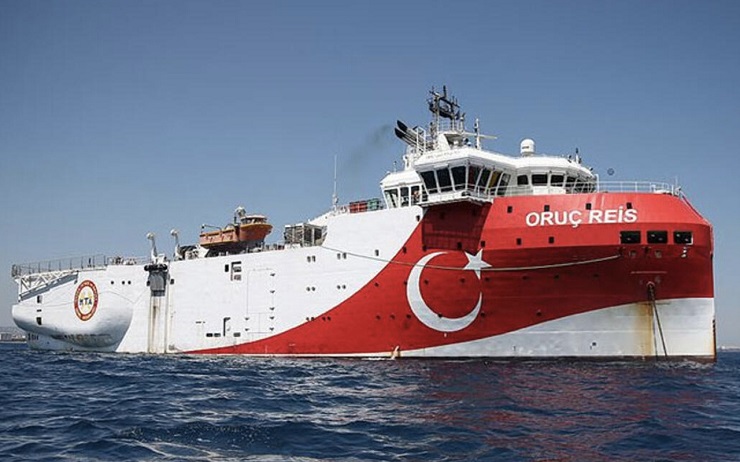Despite attempts made by the international community to de-escalate the ongoing confrontation in the Eastern Mediterranean, the crisis in the region continues to intensify.
In response to a “seismic survey” being conducted by Turkey’s Oruc Reis research vessel in a region also claimed by Greece, and to satisfy demands made by Athens and Cyprus, the European Union (EU) has started preparing sanctions against Turkey over its gas exploration efforts in a disputed territory of the Eastern Mediterranean in case the conflict can not be resolved via diplomatic means. High Representative of the European Union for Foreign Affairs and Security Policy Josep Borrell said “he would begin compiling a list of possible penalties that would be directed at individuals, but which could be expanded to include assets, ships as well as restricting Turkish access to European ports and supplies”. According to Bloomberg, the EU “is engaged in a balancing act with regard to Turkey, seeking to defend the sovereignty of member countries Greece and Cyprus while holding out hope that diplomatic initiatives can ease tensions with a strategically important partner”.
In addition, the leadership of NATO and higher officials of its member states involved in the conflict hold regular telephone conversations to lower the current tensions in the region.
Still, Ankara continues with its exploration plans in the Eastern Mediterranean. It is intent on taking advantage of any resources that, from the perspective of the Turkish leadership, belong to Ankara in the Mediterranean, Aegean and Black seas by refusing to stop conducting its surveys.
Recently, France has started to play an increasingly active role in the conflict with Turkey, especially after tensions flared up between the two countries over the civil war in Libya, and an incident at sea on June 17 that involved French and Turkish warships. Disagreements between the two sides have intensified after France decided to join military exercises with Italy, Greece and Cyprus in the Eastern Mediterranean, and “two French fighter jets and a cargo plane landed in the Greek Cypriot administration” (“as part of a defense cooperation agreement signed” on August 1). Turkish Foreign Ministry spokesman said the deployment of the aircraft in “Cyprus violated treaties regarding the control and administration of the island after independence from Britain in 1960”. In response, a few days ago, Turkey announced that its Oruc Reis exploration vessel would “carry out seismic surveys in a disputed area of the eastern Mediterranean until September 12”. On August 28, French President Emmanuel Macron said he did not think that in recent years Turkey’s strategy was that of a NATO ally.
On August 27, the parliament of Greece ratified a maritime accord the country had signed with Egypt earlier defining maritime boundaries between Greece and Egypt. The agreement has angered Turkey as it infringes on its continental shelf and also overlaps with maritime zones Turkey agreed with Libya last year. This agreement also demarcates maritime boundaries of Italy and Greece and confirms the fishing rights of Greek islands in the Ionian Sea. Government spokesperson Stelios Petsas pointed out that the ratification was urgent “given Turkey’s illegal activities”. Al Jazeera reported that Greek Prime Minister Kyriakos Mitsotakis had told parliament another bill “would extend Greece’s coastal zone in the Ionian Sea from six (about 11km) to 12 nautical miles (22km) under international maritime conventions”.
In Turkey, the ratification of the pact between Greece and Egypt is viewed as a response to the signing of the Libya–Turkey Maritime Boundary Treaty at the end of 2019 aimed at establishing “an Exclusive economic zone in the Mediterranean Sea”, which meant they could start claiming “rights to ocean bed resources”. On August 26, Turkey’s President Recep Tayyip Erdoğan indirectly urged Greece “not to take wrong steps” amid ongoing tensions in the Eastern Mediterranean and “accused Athens of committing injustice and piracy in the Mediterranean” with support from the Europeans.
As the climate in the Eastern Mediterranean continues to deteriorate, rhetoric has also intensified and the future of relations between Greece and Turkey looks increasingly bleak. This is evidenced in a report published by Turkey’s newspaper Star on August 28. According to Retired Colonel and Security Expert Ünal Atabay, if Greece risked war and ignored Turkey’s rights and interests, it would lose “its islands and Western Thrace”.
In the meantime, Turkish readers commenting on media publications, in particular the criticism of Ankara’s policy, recently started to call for Turkey’s withdrawal from NATO in favor of forming a military alliance with Russia and China.
Since Ankara has been unable to find staunch supporters of its actions in the United States, NATO or the European Union, it has started looking for new allies, focusing on fostering relations with Azerbaijan, Georgia and Ukraine. In fact, on August 5, joint military drills, involving Turkish and Azeri air and ground forces, were conducted in Baku, Nakhchivan, Ganja, Kurdamir and Yevlakh.
During a telephone conversation on August 22, Recep Tayyip Erdoğan and President of Ukraine Volodymyr Zelenskyy discussed the possibility of concluding “a bilateral agreement on cooperation in the defense sphere by the end of this year”. On February 3, 2020, the Minister of Defense of Ukraine and Turkey’s Minister of Finance and Treasury signed the general agreement on defense cooperation. “It provided for the Turkish side to allocate about $33 million for the needs of the Armed Forces of Ukraine for the purchase of Turkish military and dual-use goods”.
Vladimir Odintsov, political observer, exclusively for the online magazine “New Eastern Outlook”.

